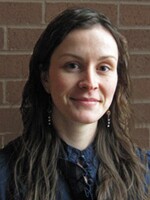La La Land has already won seven Golden Globe Awards and is nominated for fourteen Oscars, including Best Original Score and two Best Original Songs. The music and the film's story, about two struggling artists in Los Angeles who can't launch their careers, are inseparable — it's a musical, after all. But the collaboration between La La Land's composer and its director goes all the way back to college.
Composer Justin Hurwitz and director Damien Chazelle already had a successful track record with their previous film, Whiplash, but Hurwitz says selling a traditional musical in 21st century Hollywood was not easy.
"Our challenge was to make a movie that didn't feel old-fashioned or a soundtrack, songs, or score that wouldn't sound like they actually could have been in some of those older movies," the composer says. "How can we make it new, make it modern?"
The answer? Mixing American popular song with contemporary pop and big band jazz.
Hurwitz was born in California, but his family moved to Milwaukee, Wisc., when he was in middle school and he calls himself a Milwaukee native. He began studying piano at the Wisconsin Conservatory of Music right after the move. His piano teacher, Stefanie Jacob, says Hurwitz always wanted to dive into big projects.
"His senior year in high school, he learned the entire Beethoven's First [Piano] Concerto and he played it with a community orchestra," she says. "And he played it really well."
No easy task for an 18-year-old. But, Jacob says, Hurwitz was always a strong-willed, independent student who wasn't afraid of failing. "There are several different approaches to being lost — one would be to sort of swim with whatever tide is carrying you, and one would be to strike out and look," she says. "I would say that Justin would fall into the latter category."
Hurwitz went on to Harvard University, where he met Damian Chazelle. They were in a pop band together, and also collaborated on a senior thesis. That project became a prototype for La La Land: the acclaimed black-and-white independent musical, Guy and Madeline on a Park Bench. Chazelle says the only reason he wrote that movie was because Hurwitz agreed to compose its music.
"If he would have said no, our roads would have been very different and there certainly wouldn't have been a La La Land," the director says. "The smartest decision I ever made was to latch on to him and not let go."
When Chazelle and Hurwitz finally got the green light to make La La Land, they wrote and composed hand-in-hand. The first task Chazelle put to the composer was to come up with a main theme.
"I spent so much time at the piano working on demo after demo, idea after idea," Hurwitz says of what became "Mia & Sebastian's Theme." "As soon as I came up with that melody, it was like an "A-ha!" moment for me and Damien: 'OK, wow, that's the theme of the movie.'"
He and Chazelle also asked their stars, Emma Stone and Ryan Gosling, to help create the sound of the film by singing some of the songs live on camera while Hurwitz played the keyboard backstage.
"We did that because we wanted those really intimate moments to feel live and to have that live vulnerability," Chazelle says, "and to let Emma and Ryan really act those moments and those songs in a way that probably wouldn't have happened if they had to pre-record those songs in a studio months earlier."
That sometimes unorthodox approach that Hurwitz and Chazelle took to collaborating has paid off. But the director says their sentimental musical was never a sure bet.
"The idea of embracing that, not apologizing for it, not trying to coat it in any kind of irony, and also embracing the kind of emotions that can come with that, that I feel like we downplay in movies these days," Chazelle says. "The sort of full-fledged romanticism that movies of an earlier era were able to embrace without hesitation, and now it feels like we're a little scared to embrace those sometimes."
Chazelle has another movie in the pipeline, although it's not a musical. As soon as it gets a green light, Hurwitz says, he will sit back down at his piano to compose once again.
Copyright 2017 Wisconsin Public Radio


